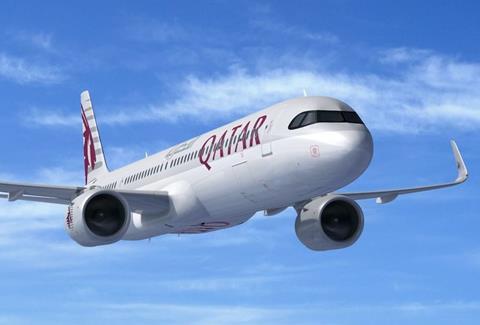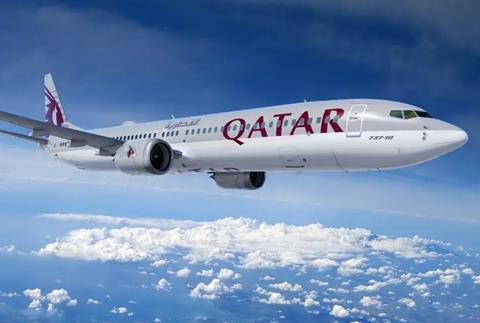One consequence of Qatar Airways’ bitter dispute with Airbus over A350 fuselage paint deterioration has been Airbus’s cancellation of the carrier’s A321neo order, with the result that the airline is attempting to block the termination.
Airbus’s legal argument for the 17 January cancellation of the 50 A321neos is based on a contractual cross-default clause – essentially that Qatar Airways’ refusal to accept A350 deliveries automatically entitles Airbus to cancel the separate A321neo deal.
Qatar had 23 A350s, all the -1000 variant, remaining in its backlog before the dispute, but the airframer has been exercising cancellation rights on individual A350s as each newly-built aircraft comes up for delivery – three of the twinjets have so far been cancelled this way, and others are likely to follow. Completed aircraft will probably be offered for sale if the dispute persists.
Airbus is trying to avert a similar situation with the A321neos, preferring to avoid having to build the aircraft in the first place.

If Qatar Airways obtains an injunction forcing Airbus to continue manufacturing the A321neos, this could mean that at least three aircraft could have entered final assembly – with several others undergoing earlier manufacturing processes – before a final ruling on the dispute.
Should the injunction then be discharged, the work on the A321neos would not only be wasted, but would demand considerable effort to undo. Removal of seats, for example, would require dismantling galleys and lavatories. The aircraft would then have to be resold, possibly as distressed airframes.
This is the foundation of the ‘balance of convenience’ legal argument with which Airbus is trying to persuade the court to rule against granting Qatar’s injunction. Maintaining the status quo – by not allowing the A321neos to be built – carries a lower risk of injustice to Airbus, if Qatar loses the A350 case, than proceeding with manufacture.
Part of the judge’s consideration over the A321neo case, a hearing on which took place on 7 April, will involve assessing whether Qatar can support its argument for an injunction by claiming that the aircraft is unique and that, without it, the airline’s business will be affected.
This puts Airbus in a curious position given that its competitive strategy normally relies on the airframer’s highlighting the particular capabilities of its aircraft over those of rivals.
Within the tactical context of the Qatar dispute, however, Airbus is having to acknowledge that Qatar has access to other sources of similar aircraft, including lessors offering A320neo-family jets, and even other aircraft types – such as the Boeing 737 Max – which are likely to satisfy its requirements.

Qatar has entered an agreement with Boeing to acquire 50 737 Max jets, and already leases a substantial number of Airbus jets. Leasing companies are due to take dozens of A320neos and A321neos over the next few years, of which a large number have yet to be placed with operators.
The judge will need to take into account whether a small number of specific destinations such as Bergen or Bilbao which, Qatar argues, can only be reached from Doha with the long-range A321LR variant ordered by the carrier, are critical to the airline’s business model – especially since Qatar’s preference is to use larger aircraft types for long-haul operations.
Around 20% of the airline’s A321neo order comprises the A321LR, but the aircraft’s maximum range in the Qatar configuration would have been around 3,500nm (6,500km), which weakens the ‘uniqueness’ claim that the aircraft would have been able to access new single-aisle sectors for the airline.
Qatar’s claimed need for capacity, ahead of the World Cup tournament in November-December 2022 is a relevant discussion point in the A350 case, but probably less so for the A321neo dispute because – at the time the order was cancelled – the first A321neo was not due to arrive until the first quarter of 2023.


























